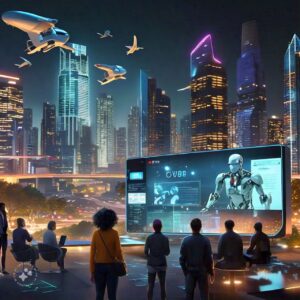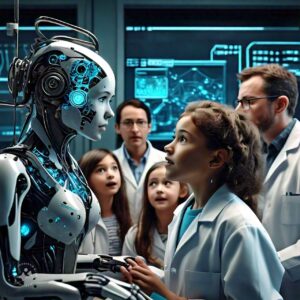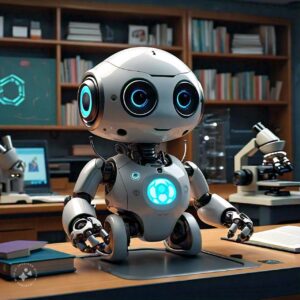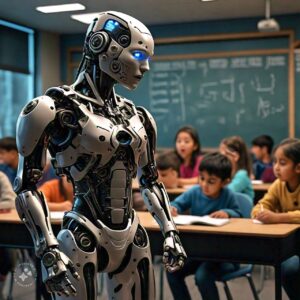
The role of Artificial intelligence in today’s world has sparked a new debate about the opportunities and challenges people face in any field. It is not only limited to a science fiction, rather a lot has been done with the help of AI. Industries have been revolutionized and health cares are transformed in a better way. There is a tremendous change in the lifestyle of people which makes it necessary to discuss the pros and cons of this newly invented technology. Below are the few perspectives mentioned to analyze the role of Artificial intelligence:
Current Landscape of AI
Before examining the role of AI, it is important to consider the current state of AI in today’s world. We are overwhelmed with the presence of automated attendants like Siri, Alexa, and Google Assistant in the smartphones, smart speakers, smart home devices, wearables, cars, and gaming consoles. Furthermore,
The use of Image Matching Technology and facial recognition software has uplifted the working of Apple Face ID, Android Face Unlock, Facebook, law enforcement agencies (FBI, CBP), and security systems (Biometrica, NEC) Tesla Autopilot, Waymo, Cadillac Super Cruise, BMW Driving Assistant, and Volkswagen IQ.DRIVE.

Various industries integrate Intelligent Service Chatbots and Automated Customer Interaction including Amazon, Google, Microsoft, Salesforce, and Zendesk, and websites/apps of companies like Facebook, Twitter, and LinkedIn. The financial forecasting in Banks (JPMorgan Chase, Goldman Sachs), financial institutions (Fidelity, Vanguard), and fintech companies (PayPal, Stripe), as well as accounting software (QuickBooks, Xero) and trading platforms (Bloomberg, Reuters ) has escalated the performance of numerous institutes.
Healthcare forecasting is present in Hospitals (Mayo Clinic, Cleveland Clinic), insurance companies (UnitedHealth, Aetna), pharmaceutical companies (Pfizer, Merck), and health tech platforms (IBM Watson Health, Epic Systems).
Opportunities: Empowering Personal growth
The future of AI carries gigantic promises:
1. Enhanced Health Outcomes
Artificial Intelligence is quite beneficial in revolutionizing the field of healthcare. It can predict and diagnose the diseases and can tailor the therapy accordingly. It can assist in automated medical image examination along with AI generated patient monitoring. It can play its part in simplifying the health record by optimizing the care coordination.
- Customized Healthcare, DNA-Based Diagnosis, Targeted Treatment, Individualized Care, and Gene-Informed Medicine
- Medical AI solution
- Robotic-Assisted Medical Procedures
2. Optimized Efficiency
Artificial Intelligence is transforming the industries and businesses in unique way by generating tremendous results in return. With the help of AI driven tools, companies can enhance their productivity up to 25-40% by decreasing the operational costs by 20-30%. It can bring perfection in accuracy rate up to 99% and can authorize the companies to generate data-driven decisions.
- Intelligent Process Automation (IPA)
- Business Process Optimization (BPO)
- Workflow Automation
- Efficient Process Management
- Digital Transformation

3.Smart Transportation Systems
Artificial Intelligence driven transport system is transforming the urban transportation system, reducing travel time, enhancing commute speed, and ensuring the security of transportation system. These systems harness innovative technology including image recognition systems, IoT devices, AI frameworks, deep learning models, and distributed computing architecture. It assist in the streamline of traffic movement by optimizing public transportation system.
- Autonomous Vehicles (AVs)
- Smart Traffic Management
- Intelligent Urban Ecosystems
4. Innovative Learning Systems
Artificial Intelligence driven Innovative learning system is playing its part in transforming the educational department by accelerating the students participation and teachers effectiveness. This system is integrating the dynamic learning platforms, Language analysis software, and automated knowledge mapping in educational institutes to customize the learning journey and on-time evaluation in interactive learning environment.
- Adaptive Learning Systems
- Intelligent Learning Assistance
- Virtual Learning Environments (VLEs)

Challenges: Venturing into the Unseen
While Artificial intelligence offers amazing benefits, challenges’ also persist which are important to consider:
1. Labor Market Shift
Artificial Intelligence (AI) driven automation is consistently changing the labor market, inculcating numerous challenges. As AI is rapidly replacing the machines, the ratio of displacement has been surged by 30-40%. It is raising major concerns regarding Labor market disruption, skill decay, and competency erosion. It is significantly expanding the skill disparity and financial inequality, leading to the dire need of persistent learning and career adaptation.
- Technological Displacement of Labor
- Workforce Talent Transformation
2. Moral Integrity and Fairness
Artificial Intelligence (AI) is posing significant concerns regarding the moral integrity and fairness. The discriminatory AI decision-making processes, lack of validation, and confidential data handling threats are raising ethical issues. To tackle this problem, it is mandatory to create non-biased unique development teams. AI fairness demands that comprehensive validation protocols to prevent future ethical concerns and upgrade the moral responsibility.
- Ensuring Algorithmic Fairness
- Fostering Trust Through Disclosure
3. Security and Privacy
The integration of Artificial Intelligence (AI) is raising major concerns regarding security and privacy. It is lapsing the security and getting involved in the data theft. There is exploitation of biometric data handling and proactive monitoring and monitoring. AI can also pose security risk by AI-generated military assaults. It can be mitigated by:
- Ensuring Data Confidentiality
- Mitigating Artificial Intelligence-Generated Threats (AIGT)

4. Supervisory Management
The surge of Artificial Intelligence is generating supervisory management issues which needs to ensure the security reliability of AI and its validation by intensifying the human-AI interface capabilities. AI guidelines should be standard and properly mentioned to encourage the human-AI understanding and trust.
- Creating Artificial Intelligence Governance Frameworks
- Guaranteeing Ethical AI Implementation
The Future of Work: AI-Assisted Human Decision-Making
In the future, there will be strong correspondence between the Artificial intelligence and humans:
1. Enhancing Human Potential
- Intelligent Innovation Acceleration and Smart Creativity Tools
- Hybrid Intelligence Decision Support and Human-AI Collaborative Analytics
2. Professional Capability Enhancement
- Automation-Ready Workforce Development
- Fostering Innovation and Creativity
- Cultivating Continuous Professional Growth
3. Transforming Learning Paradigms
- Incorporating Artificial Intelligence Education
- Equipping Students for Emerging Tech Careers

Conclusion: Visionary Transformation
The complexity and multifaceted nature of AI future invokes challenges and also present tremendous opportunities for growth, innovation, and progressive success. By comprehending the horizon and tackling the challenges, we can utilize AI’s potential to:
– Transform human life
– Stimulate prosperity
– Resolve complicated issues
In light of the above role of AI future challenges’ and opportunities, it can be said that human is diving into new world of technology surpassing the old traditional norms of performing industrial and professional work. There is a lot to be discovered in near future.
Let’s venture on this process together, endorsing the future of artificial intelligence with wonder, curiosity, and inspiration.


Pingback: 5 Predictions for Human-Artificial Intelligence Collaboration
Pingback: Advancing Technology in Pakistan: Innovation Driving Growth